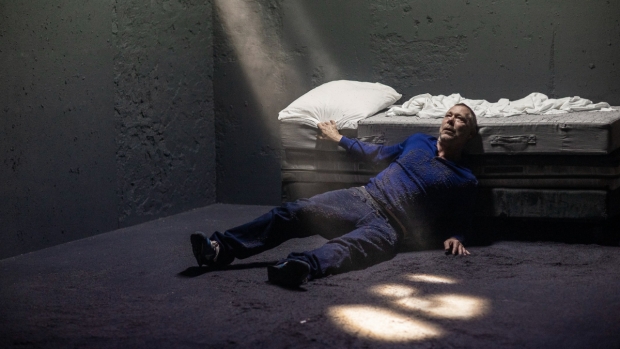”Who Killed My Father?” at the Young Vic – review

© Jan Versweyveld
This play opened on the night the Queen died, which meant that a minute of sombre silence preceded another long period of stillness as Hans Kesting steps onto the stage, briefly illuminated in light. He begins to talk about his father, who is dying, at the age of barely 50.
He is, he says, a man who “belongs to the class of humans who politics has doomed to an early death.” As he talks, his body shifts slightly: when his hands are under his jumper, he is the obese, broken, dying man, coughing from all the cigarettes he has smoked in his life. When his hands settle gently in front of him, folded, he is that man’s gay son, returning to the place he has fled to make his peace with his father and understand his life and death.
Based on Édouard Louis’s autobiographical novel, and adapted and directed by Ivo van Hove, Kesting’s powerful performance roots the play’s fury with the basic unfairness of life in the human heart. The contrast between father – hobbling to the door, bent over double with his hacking cough – and the son – gentle, thoughtful and reflective – is an astonishing act of transformation and yet easy and unforced. It is painful to watch yet also full of love, as if the son’s empathy with the father’s pain has taken a physical form.
But the entire play is like that. It takes you in surprising directions. Designer Jan Versweyveld provides a concrete square of a room, pitted with the holes that the father has punched in walls when his anger overtakes him in alcoholic furies. Yet, the son explains, the violence his father witnessed from his own father in the past protected him; his father would hit the walls rather than the family.
He rejects his son because he does not conform to the macho man image his working class, factory-working life compels him to uphold. Yet when the son pleads for the video of Titanic for his birthday present – “don’t you want a remote-controlled car instead?” – he loves him enough to buy it for him and to sing along to Celine Dion.
In van Hove’s subtle, tight direction, a TV set on stage fills with the image of Leonardo DiCaprio and Kate Winslet as Kesting leans back against the wall, arms outstretched, full of the joy of it. In a repeated scene, Versweyveld fills the stage with glitterball dancing light as the teenage son dances with rising passion to “Barbie Girl”, trying to make his father acknowledge his longing for something other than this suffocating, gray room.
Occasionally, the sociology and political analysis overwhelm the essential drama. The man’s analysis that politics broke his father’s back in a work accident, that the ruling class ground him down into poverty and disappointment is fascinating. “The history of your body stands as an accusation against political history,” he concludes. But though the anger feels earnt, it also dissipates the play’s most extraordinary quality: the relationship between a father and son, complex and full of sadness, embodied by one great actor.












